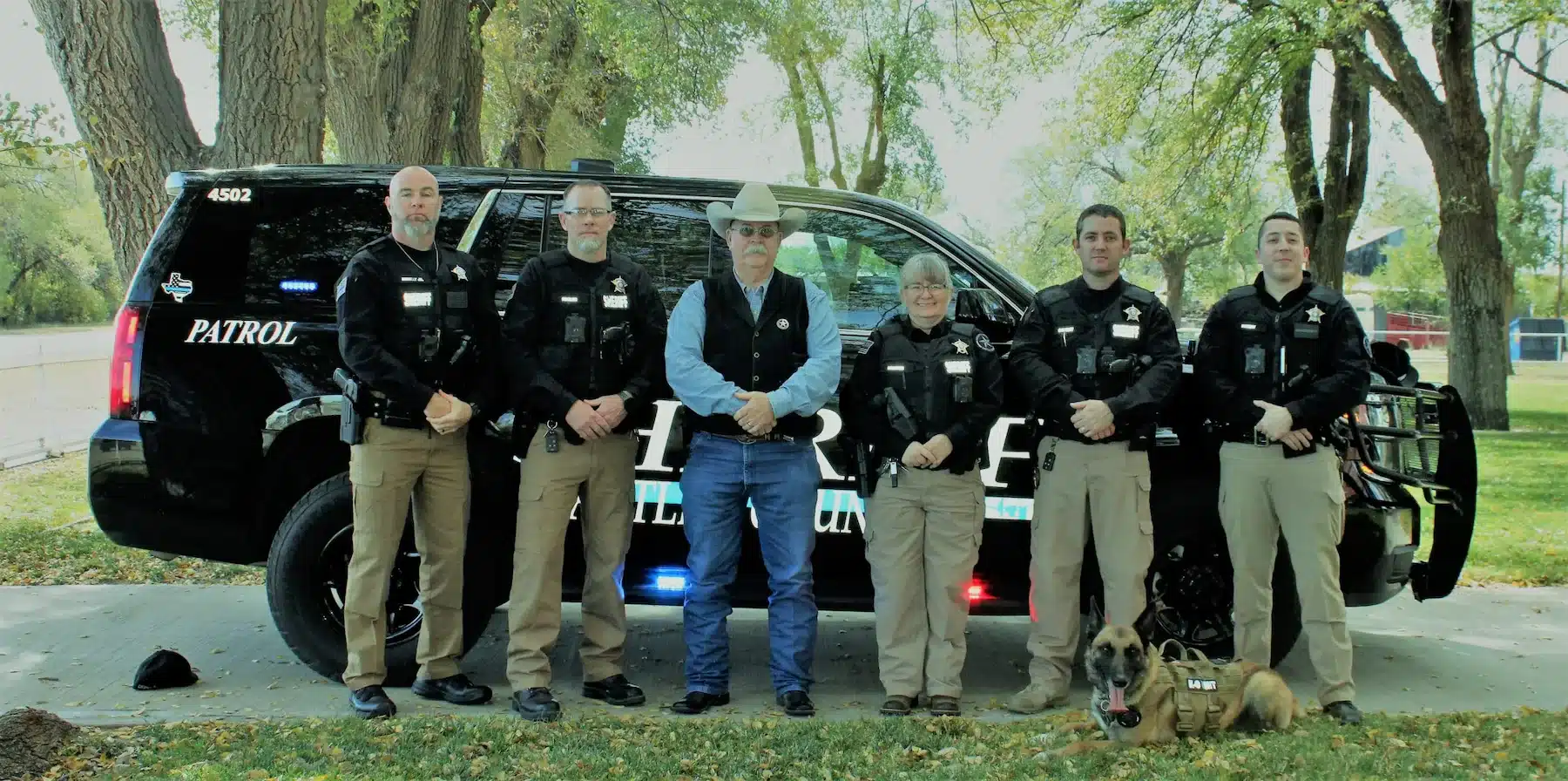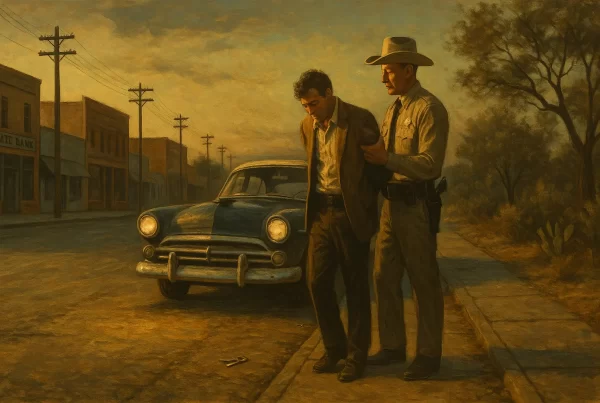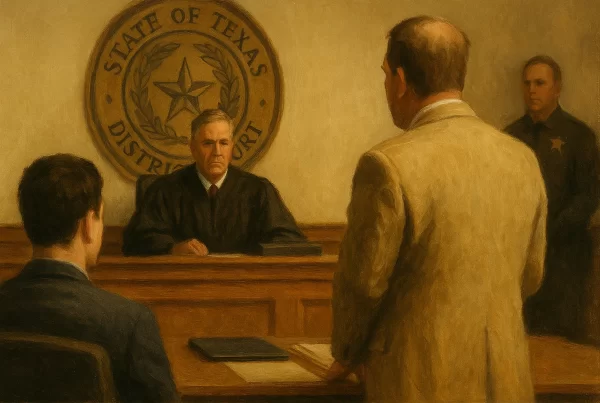Sheriffs in Texas are elected law enforcement officers responsible for maintaining law and order, overseeing jails, and providing security to the courts. Sheriffs lead the county sheriff’s offices in each of Texas’s 254 counties. These offices employ deputy sheriffs, jailers, court wardens, criminal investigators, administrative staff, and emergency dispatchers.
The sheriff’s office patrols rural areas and unincorporated parts of the county, responds to emergencies, investigates crimes, and enforces state and local laws. Working alongside other local, state, and federal law enforcement agencies, sheriffs and their deputies are a critical part of Texas’ overall law enforcement system.
Elections of Sheriffs
Sheriffs are elected by voters in countywide elections. Elected sheriffs hold a 4-year term of office. If a vacancy arises, the County Commissioners Court may appoint a new sheriff to serve until the next general election.1
Like most elective offices in Texas, sheriffs are selected in partisan elections. If a sheriff’s race has multiple candidates from the same political party, a primary election is held to determine the party’s nominee. Primary elections are held in the spring, typically about eight months before the general election.
Duties of Sheriffs
County sheriffs in Texas have a broad mandate to enforce laws and preserve order. The Texas Code of Criminal Procedure (Art. 2.17) says, “Each sheriff shall be a conservator of the peace in his county, and shall arrest all offenders against the laws of the State, in his view or hearing, and take them before the proper court for examination or trial. He shall quell and suppress all assaults and batteries, affrays, insurrections and unlawful assemblies. He shall apprehend and commit to jail all offenders, until an examination or trial can be had.”
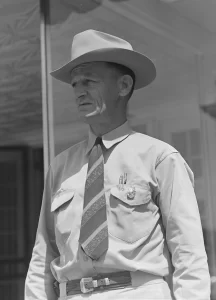
More specifically, sheriffs have an array of duties defined by state law:
- Patrol unincorporated areas of the county and investigate crimes;
- Locate and arrest wanted fugitives within the county;
- Serve legal documents, including subpoenas, warrants, and civil process;
- Enforce court orders such as evictions and asset seizures;
- Manage the county jail and ensure the welfare of inmates;
- Transport prisoners between the jail and the courtroom;
- Coordinate with the state prison system and state law enforcement;
- Regulate bail bondsmen in counties with no bail bond board;
- Convene semiannual meetings on school safety (in smaller counties);
- Serve as tax assessor-collector in counties with a very small population;
- Perform animal control in counties lacking an animal control agency;
- Serve jury summons to potential jurors;
- Provide security for jurors during trials.
Historical Role of Sheriffs in Texas
The office of sheriff in Texas dates back to the early Republic and was formalized under the Texas Constitution of 1845. Originally modeled on English common law traditions and Southern U.S. practices, sheriffs served as both peacekeepers and tax collectors.
Their authority was especially significant in frontier counties during the 19th century, when they functioned as the primary legal authority. Although modern sheriff’s offices are more specialized, the position still carries deep historical roots tied to rural law enforcement traditions.
Relationship to County Government
Although sheriffs are part of county government, they function with a high degree of independence once elected. The Commissioners Court sets the budget but cannot interfere with day-to-day law enforcement decisions. This creates a structural tension that makes the sheriff one of the most autonomous officials in local government. Sheriffs are accountable primarily to the voters, though they may be removed under for official misconduct or incompetency.2
Qualifications to Become Sheriff
To serve as a county sheriff in Texas a person must be at least 21 years of age, must not have been convicted of a felony, and must have a high school diploma or a high school equivalency certificate. The age requirement is lowered if the person has served at least two years in the U.S. military or completed 60 college credit hours.3
As a type of law enforcement officer, also called a peace officer, a county sheriff must obtain a license from the Texas Commission on Law Enforcement within a year of taking office, if the sheriff does not already have such a license.
County sheriffs in Texas are also subject to a requirement to execute a bond before performing the duties of office, in an amount established by the commissioners court, between $5,000 and $30,000.
Role of Sheriff’s Deputies
Sheriffs employ deputies to help them fulfill their duties. Deputies must be licensed law enforcement officers. They must complete basic training at a law enforcement academy, pass the TCOLE exam, and maintain certification through ongoing education.
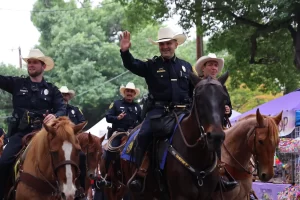
The number of deputies employed by sheriff’s offices in Texas varies widely by county. In small rural counties, the sheriff may have only a handful of deputies. In medium-sized counties, the sheriff may have 20-50 deputies. Sheriff’s offices in large urban counties employ hundreds of deputies, or more than 2,000 in the case of Dallas and Harris Counties.
The budget of sheriff’s offices and the number of authorized personnel is set by the Commissioners Court in each county.
Sheriffs may also appoint reserve deputy sheriffs, with the permission of the commissioners court. They may be called into service if the sheriff considers it necessary to have additional officers to preserve the peace and enforce the law. This system is a vestige of the “sheriff’s posse,” an armed escort as seen in Western films.
Oversight of County Jails

Sheriff’s offices typically employ correctional officers to operate the county jail. They are responsible for overseeing the daily operations of county jails, ensuring the safety and security of inmates, and maintaining order within the facility.4 Jailers manage inmate housing, conduct searches for contraband, and enforce rules to prevent disturbances. They also handle the transportation of inmates to and from court hearings or medical appointments.
To become a jailer in Texas, individuals must meet certain eligibility requirements, including passing a background check, completing required training, and obtaining a certification from the Texas Commission on Law Enforcement (TCOLE).5 Jailers are often part of the sheriff’s department but focus specifically on corrections duties, separate from patrol officers or deputies who handle law enforcement responsibilities in the community.
Controversies and Public Scrutiny
Sheriffs occasionally attract public scrutiny, especially in relation to jail conditions, use-of-force incidents, or political partisanship. High-profile incidents involving inmate deaths, poor jail conditions, or alleged abuse of power have led to investigations by the Texas Commission on Jail Standards and triggered civil rights lawsuits. These cases highlight the tension between electoral accountability and the administrative power sheriffs wield.
FAQ
A sheriff is an elected law enforcement officer who apprehends fugitives, runs a county jail, and leads a team of sheriff’s deputies and other law enforcement personnel, among other duties.
Each sheriff’s department has county-wide jurisdiction within its respective county. However, in counties with large cities, sheriff’s departments mostly concentrates their activities outside city limits where municipal police officers cannot operate. This means that sheriff’s departments mostly operate in rural and suburban areas.
To become a sheriff in Texas, a person must generally be at least 21 years old (or 18 with military service or 60 college credit hours), have no felony convictions, and hold a valid Texas driver’s license, and be a U.S. citizen. They must also have law enforcement experience or meet educational requirements, and they must pass a background check and complete the necessary training. Sheriffs are elected to serve four-year terms in each county.
Police departments are created by cities, while sheriff’s departments are run by counties. A sheriff is elected, but a police chief is usually appointed. Police have jurisdiction within city limits, whereas sheriffs have countywide jurisdiction. Sheriffs also run county jails and transport prisoners to court, while police typically do not manage jails or provide court security. Despite these differences, sheriffs and police often share jurisdiction in certain matters and cooperate regularly.
As peace officers, sheriffs operate under standards set by the Texas Commission on Law Enforcement. The jails that they run are regulated by the Texas Commission on Jail Standards. The Texas judiciary plays a critical role in ensuring the due process rights of criminal defendants arrested by sheriffs and their deputies. The budget and procedures of sheriff’s departments are subject to oversight by the county commissioners court in their county. In cases of incompetency, official misconduct, or intoxication, sheriffs can be removed from office by a district court following a jury trial.
